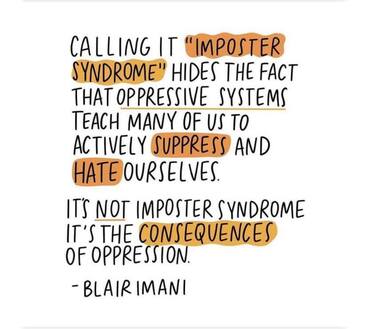 In addition to providing occasional perspectives on pedagogy, this blog will often be a reflection on my social media posts, drawing on some combination or synthesis of posts/insights that I have boosted on Facebook or Twitter. I'll start with this image, posted a few days ago by Syreeta Neal on a Facebook group to which we both belong: Image description: text stating “Calling it *imposter syndrome*” hides the fact that _oppressive systems_ teach many of us to actively *suppress* and *hate* ourselves. It’s _not_ imposter syndrome, it’s the *consequences* of oppression. - Blair Imani” - text between asterisks is highlighted in dark yellow. As I mentioned on Facebook, I think it's especially relevant for folks who are from non-dominant identities in a particular area of academia or professional work (and that might mean different identities in different contexts). And... .... quite a few of us who are white (cisgender, straight, middle-aged) men have experienced some version of imposter syndrome in our professional lives. But while I think it's valuable for us to offer solidarity in this to those who are less obviously perceived to "belong" in our profession because of their identities or intersections thereof, I suspect that imposter syndrome has a very different set of consequences and deeper roots for those who have been told/shown over and over again (whether explicitly or implicitly) that they "don't belong" than they do for those of us who can readily be perceived as "belonging" within the dominant system, and I think I/we need to be careful to say things like "I've also felt imposter syndrome" as if the feeling were as easily dismissable for marginalized folks.
Something for me to ponder more, and I hope this is an interesting reflection point for others too. Please feel free to join the discussion on the original Facebook post. (In the original thread someone -- perhaps Syreeta Neal? -- also referenced this article in the Harvard Business Review that is recent and apropos of the topic, particularly focusing on the experience of women of color with consequences of oppression that are problematically characterized as "imposter syndrome.") In the thread where this was originally posted, there was an interesting conversation about finding a different term for "imposter syndrome" that would reflect this perspective, given the negativity of the term "imposter". I reflected that it reminded me of the social model of disability, according which someone is disabled not by their inherent bodymind configuration but by social barriers that are either explicitly created or at least not removed by those who have the power to determine what kinds of bodies and minds are worthy of acceptance. Certainly "imposter syndrome" is a term that pathologizes an individual (by which an individual self-pathologizes?) and in that respect it's a medical-model term that resonates with the individual-blaming medical model of disability. However, in grammatical terms it's not as easily reclaimed as "disabled", which as a past participle easily accepts the notion that someone/something is responsible for the "disabling" of an individual. Might there be a way to underscore the social model as applied to "imposter syndrome" by the use of a different term?
0 Comments
Your comment will be posted after it is approved.
Leave a Reply. |
Reflections on equity and justice in pedagogy, music, disabilityCategories
All
Archives |

 RSS Feed
RSS Feed